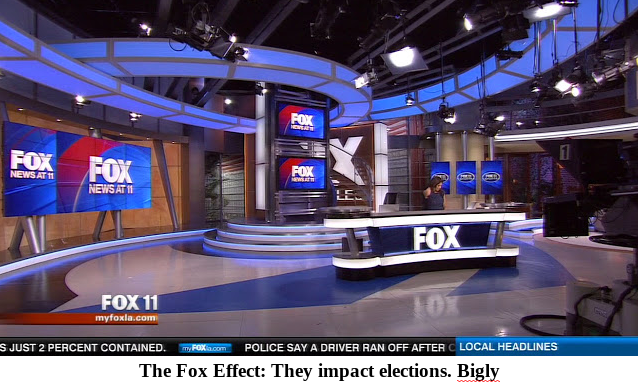The Fox effect
by digby
Even in the hurricane:
In case you were wondering if this matters, well, Donald Trump obsessively watches Fox.
And the network persuades more people than him:
Fox News is, by far, America’s dominant TV news channel; in the second quarter of 2017, Fox posted 2.35 million total viewers in primetime versus 1.64 million for MSNBC and 1.06 million for CNN. Given that Fox was founded by a longtime Republican Party operative and has almost exclusively hired conservative commentators, talk radio hosts, and the like to host its shows, it would stand to reason that its dominance on basic cable could influence how Americans vote, perhaps even tipping elections.
A new study in the American Economic Review (the discipline’s flagship journal), with an intriguing and persuasive methodology, finds exactly that. Emory University political scientist Gregory Martin and Stanford economist Ali Yurukoglu estimate that watching Fox News directly causes a substantial rightward shift in viewers’ attitudes, which translates into a significantly greater willingness to vote for Republican candidates.
They estimate that if Fox News hadn't existed, the Republican presidential candidate’s share of the two-party vote would have been 3.59 points lower in 2004 and 6.34 points lower in 2008.
For context, that would've made John Kerry the 2004 popular vote winner, and turned Barack Obama's 2008 victory into a landslide where he got 60 percent of the two-party vote.
"There is a non-trivial amount of uncertainty" about those estimates, Yurukoglu cautions. "I personally don't think it's totally implausible, but it is higher than I would have guessed prior to the research." And even if the effect were half as large as estimated, that’d still mean that Fox News is having a very real, sizable effect on elections.
How Fox News transformed America
Martin and Yurukoglu integrated a vast array of data — on Fox's channel position and viewership, individual/zip code/county level presidential voting behavior, and transcripts of cable news shows to showcase their ideology — into an extensive model that they can then use to estimate how effective Fox (and CNN and MSNBC) is at persuading viewers to vote its way.
[...]
The effects of CNN and MSNBC on centrist voters are mostly negligible; MSNBC, in 2000 and 2004, modestly increased odds of voting Republican, before it turned left in time for 2008. But Fox News increases Republican voting odds for centrists, for Democratic viewers, and even, in 2004 and 2008, for Republicans already strongly inclined to vote that way. Watching three minutes more of Fox News per week in 2008 would have made the typical Democratic or centrist voter 1 percentage point likelier to vote Republican that year.
“Fox is substantially better at influencing Democrats than MSNBC is at influencing Republicans," the authors find. While most Fox viewers are Republican, a sizable minority aren't, and they're particularly suggestible to the channel's influence. In 2000, they estimate that 58 percent of Fox viewers who were initially Democrats changed to supporting the Republican candidate by the end of the election cycle; in 2004, the persuasion rate was 27 percent, and 28 percent in 2008. MSNBC, by contrast, only persuaded 8 percent of initial Republicans to vote Democratic in the 2008 cycle.
These are big effects, with major societal implications. The authors find that the Fox News effect translates into a 0.46 percentage point boost to the GOP vote share in the 2000 presidential race, a 3.59-point boost in 2004, and a 6.34-point boost in 2008; the boost increases as the channel's viewership grew. This effect alone is large enough, they argue, to explain all the polarization in the US public's political views from 2000 to 2008.
What's more, they find that Fox isn't setting its ideology where it ought to to maximize its viewership. It's much more conservative than is optimal from that perspective. But it's pretty close to the slant that would maximize its persuasive power: that would result in the largest rightward movement among viewers. CNN, by contrast, matched its political stances pretty closely to the viewer-maximizing point, showing less interest in operating as a political agent.
Fox seems lost without Ailes so I'm not sure that they're going to maintain their hold much longer. He had a unique gift. But they are rapidly moving into the Breitbart realm so it's possible that even if they don't retain the power to persuade, their propaganda style is becoming even more extreme.
Ailes always maintained the fiction that they were doing straight news and that gave people the ability to bullshit themselves into adopting their narrative if they were drawn to it. Breitbart-Fox isn't even trying. It's straight up incitement, no holds barred. It's Trump. And they have figured out that flattering him will get their agenda passed and please their audience. Watch Fox and you can see what Trump is thinking.
.
